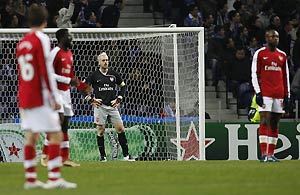Controversy as Villa keeper handed second yellow for shootout crowd taunting... but isn't sent off
Emi Martinez was saved by a new rule that resets yellow cards at the end of extra time, meaning his second yellow for taunting…

Arsenal's players react after the oppening goal from FC Porto's Bruno Alves (not seen) during their Group G Champions League soccer match at the Dragao stadium in Porto, Portugal, Wednesday Dec. 10, 2008. AP Photo/Paulo Duarte
So another FA Cup final on a poor Wembley pitch and another Chelsea game involving a controversial refereeing decision. In the end, Florent Malouda’s disallowed second-half goal was meaningless, but the thought has been nagging away at me all week. What if it had mattered?
If Everton had managed an equaliser, I’m guessing we wouldn’t have spent the week talking about Guss Hiddink’s shiny new watch.
Instead, it would have been goal-line technology on the agenda.
First let me be clear, due to the speed and ferocity with which Malouda struck his shot, there is no way referee Howard Webb or his assistant could have seen whether the ball crossed the line or not.
For once England’s ‘best referee’ wasn’t to blame.
With the referees not being at fault, one has to ask how could this have been prevented? For many the answer is simply goal-line technology.
FIFA president Sepp Blatter isn’t so sure.
In 2005, the world football governing body toyed with the idea in the lead up to the World Cup in Germany. Microchip technology was tested at the Under-17 World championships in Peru that year.
The way it worked was that the football had a microchip inside, so when it crossed the goal-line, the referee was alerted directly and instantaneously by a bleeper-type system rather than any video replays being used.
This was followed by further experiments with similar types of goal-line technology in 2007, including at that year’s Club World Cup in Japan.
Since then the movement has petered out, with FIFA declaring in a statement that they would not be considering the use of goal-line or video technology “until further notice.”
Michel Platini is another man opposed to the introduction of the technology into football (it’s probably the only thing he and Blatter agree on other then the EPL being too rich).
UEFA have a different take on proceedings and over the last couple years have been trialling an experiment with four assistant referees. The two extra officials stand beside either goal and look for discrepancies in the penalty area and to watch if a ball crosses the line.
This approach is now going to be trialled in next seasons Europa League.
Frankly I’m not convinced.
One of the key arguments for FIFA ruling out the use of video technology is that there must be one process for officiating football at all levels of the game. So what is good enough for the World Cup should be good enough for your kick-about Sunday leagues.
With there already being a referee shortage at all levels of the game, how can you expect Football Associations the world over to manage the need for another two referees across all levels of the game.
Dare I say it, Mark Shield we may need you back.
In terms of video technology, I’m entirely opposed to it.
Football is not like cricket or tennis. A game of football is both significantly shorter and has a natural, mostly unbroken, flow to it.
An instantaneous decision using goal-line technology on the other hand is a different matter. If the technology works, then it won’t interfere with the natural flow of the game and would increase the integrity of officiating.
The designers of the goal-line system used at the Club World Cup in 2007, Adidas and Cairo, say their technology is reliable and ready for use.
For their part, FIFA argue the technology isn’t 100 percent perfect. Even if that’s true, Blatter isn’t encouraging any further development and research to make it so.
Once again the argument that goal-line technology can’t be instituted across all levels of the game pops up from FIFA.
My response is simple, they play football a few hundred meters down the road from my house every weekend and the referee there doesn’t have a wireless headset to communicate with his assistants.
But nobody minds.
There is too much money on the line at the highest levels of the game for such a significant irregularity to go on unchecked. Most of all, football’s biggest stakeholders, the fans, deserve better.
In 1966 when England famously beat West Germany 4-2, with thanks to a controversial ‘goal-line’ decision, they didn’t have the technology available to them to get this decision right. It would seem we now do.
Like banning automatic weapons after a violent shooting, it’s all too easy to act after the fact. But by then it’s always too late.
To perceive a potential problem before it occurs, and then act to prevent it, takes real courage and leadership.
Sepp Blatter, the ball is in your court. And if you don’t think it matters, then just ask Franz Beckenbauer.